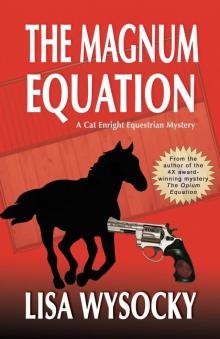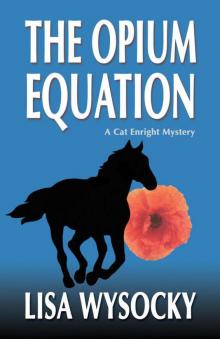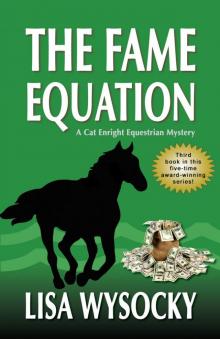- Home
- Lisa Wysocky
The Magnum Equation
The Magnum Equation Read online
Published by
Cool Titles
439 N. Canon Dr., Suite 200
Beverly Hills, CA 90210
www.cooltitles.com
The Library of Congress Cataloging-in-Publication Data Applied For
Lisa Wysocky––
The Magnum Equation
p. cm
ISBN 978-1-935270-26-3
1. Mystery 2. Horses 3. Southern Fiction I. Title
2013
Copyright 2013 by Lisa Wysocky
All Rights Reserved
including the right of reproduction in whole or in part in any form.
Printed in the United States of America
1 3 5 7 9 10 8 6 4 2
Book editing and design by White Horse Enterprises, Inc.
For interviews or information regarding special discounts for bulk purchases,
please contact [email protected]
Distribution to the Trade: Pathway Book Service,
www.pathwaybook.com, [email protected], 1-800-345-6665
Other Books by Lisa Wysocky
Nonfiction
The Power of Horses
Success Within
Front of the Class (with Brad Cohen)
My Horse, My Partner
Horse Country
Success Talks
Two Foot Fred (with Fred Gill) Horseback
Walking on Eggshells (with Lyssa Chapman)
Hidden Girl (with Shyima Hall, 2014)
Fiction
The Opium Equation
DEDICATION
To the horses, for they make life worth living.
CAST OF MAIN CHARACTERS
Cat Enright: A horse trainer who lives near Nashville, Tennessee. She is twenty-nine, single (but in a relationship––she thinks), impulsive, vulnerable, and the owner of a small stable.
Jon Gardner: Cat’s stable manager and right hand. No one, Cat included, knows much about him, which is the way he likes it.
Darcy Whitcomb: Seventeen-year-old teenager with a trust fund. She’s spoiled, but Cat loves her like family.
Agnes Temple: Eccentric woman of a certain age with short, spiky, electric-blue hair. She owns two horses in Cat’s barn.
Amanda Prentiss: Eleven-year-old youth kid who trains with Cat. Amanda suffered a prenatal stroke and has some weakness on the left side of her body.
Annie Zinner: A horse trainer from Oklahoma and a mother figure to Cat. Annie has experienced a lot of hard times in her life.
Tony Zinner: Annie’s husband and training partner. He worked a factory job for decades to keep their training business going.
Noah Gregory: Horse show manager and long time friend of Cat’s. His reputation is on the line when things go very wrong at a prestigious all-breed horse show.
Bubba Henley: Budding juvenile delinquent and ten-year-old son of a neighboring Tennessee trainer. He and Cat became close after Bubba was kidnapped earlier in the year.
Hill Henley: Bubba’s father and fourth generation Tennessee Walking Horse trainer. He may know more than he’s telling.
Keith Carson: A neighbor and country music superstar. Cat has a secret crush on Keith and is thrilled that he is performing at the horse show exhibitor party.
Brent Giles: A small animal veterinarian from Clarksville who is dating Cat. Cat likes him, but isn’t sure she wants to take it to the next level.
Martin Giles: Local deputy from Cat’s home in Ashland City––and Brent’s brother.
Mike Lansing: Texas horse trainer. Youth rider Melanie Johnston shows out of his barn.
Judy Lansing: Mike’s wife and youth coach.
Cameron Clark: A trainer, and Cat’s former boyfriend. He is tall, dark, and handsome––and knows it.
Debra Dudley: Owner of the beautiful Arabian colt, Temptation.
Zach Avery: Debra’s trainer.
Reed Northbrook: Olympic caliber competitor.
Hunter Northbrook: Reed’s son.
Melanie Johnston: Youth exhibitor who has a love/hate relationship with Darcy.
Ambrose: Show security guard hired by Cat.
Lars: Agnes’s oddly named driver.
Linda Carruthers: The show’s equine veterinarian.
Hank: Cat’s incorrigible Beagle-mix puppy.
Mickey: The Zinners’ Jack Russell terrier and a friend of Hank’s.
Sally Blue: A (possibly) psychic, red roan Appaloosa mare owned by Agnes Temple. Sally is very loyal to Cat.
Redgirl’s Moon: A tall and elegant chestnut mare owned by Agnes. Reddi is a go-getter who excels in English events.
Peter’s Pride: A tall, older black gelding owned by Darcy Whitcomb. “Petey” is a calming influence on Darcy, but he also likes to play.
Hillbilly Bob: Bay, aged gelding owned by a local orthopedic surgeon. Cat swaps training fees for treatment of broken bones and other injuries, and has won several championships on Bob.
Glamour Girl: Gorgeous, excitable, yearling filly. Gigi is owned by Mason Whitcomb, Darcy’s dad.
Wheeler: A short, stocky palomino gelding owned by Amanda Prentiss. He is not all that athletic, but is very confident about what he can do.
Middle Tennessee State University (MTSU) Equestrian Facility
Table of Contents
Dedication
Cast Of Main Characters
1
2
3
4
5
6
7
8
9
10
11
12
13
14
15
16
17
18
19
20
21
22
23
24
25
26
27
28
29
30
31
Epilogue
Food For Thought: Book Club Questions
About The Author
Glossary
Apple Butter from the Apple Tree
Acknowledgements
Coming Soon:
1
THERE WAS NO MISTAKING IT. The colt looked quite dead.
There is something unsettling about a dead horse. The enormous size, maybe. Or, the absolute stillness. This yearling lay diagonally across the stall floor, his brown and white speckled body pillowed deep into wood shavings. Flies buzzed around his face and his tongue protruded slightly. His nose showed the hint of a wrinkle, as if he found his predicament distasteful.
The veterinarian, a slim, grim-faced woman I didn’t know, was putting her gear away. I caught her eye and she said a single word: “Colic.”
My heart sank. Colic was a dangerous, unpredictable gastrointestinal ailment and horse owners took great care not to stress a horse’s system, as stress was a main cause. Simply put, colic was a big tummy ache and because horses cannot vomit, it often became deadly. Horse people knew that many things besides stress could cause colic: heat, overwork, bad food, too much food, not enough food … the list goes on. Here, at this prestigious all-breed show, any number of things could have caused this champion colt to become ill.
I felt dizzy all of a sudden and sank to the stall floor. Then I made a pretense of examining bits of shavings in hopes the others wouldn’t think me faint hearted.
“You all right?” a voice asked from somewhere behind my left shoulder.
“It’s so unfair,” I replied, dusting off the shavings in my hand. A few pieces landed on the colt’s right foreleg and I quickly brushed them off. Leaving them there felt disrespectful. “You and Annie worked so hard, Tony. To do so well and to bring Starmaker this far … I feel ba
d for you and I don’t know anything I can do to make things better.”
“Nothing you can do, except keep on being a friend. You’re here when we need you and that helps,” said Tony’s wife, Annie, who joined us at the open stall door. I blinked back tears as Annie pulled me up out of the shavings and gave me a tight hug.
“It’s me who should be crying, not you,” she said with a wry smile.
She was right. Annie Zinner had a lot to cry about.
Tony and Annie were childhood sweethearts who married a week after their high school graduation. Both sets of parents were against the couple marrying so young and offered no help whatsoever. But Tony worked at a local factory and Annie waited tables, and they were able to make ends meet. Not only that, they were also able to put a little money aside to get Tony started part-time as a conditioner and handler of halter horses, horses that were judged on their build.
There had been medical issues for both, too. Annie’s high blood pressure, and Tony’s diabetes and asthma, kept both on their toes with regard to diet and exercise. Despite rigorous attention to their health, as the couple had gotten older the conditions had worsened. Nothing critical yet, but it was possible that not too many years down the road that any of their medical concerns could turn serious.
A few years ago the couple, both pushing fifty, risked everything they had to buy a world champion mare. Some successful halter horses do not produce champion offspring, but this mare had produced several. The Zinners bought her and bred her to the current world champion aged stallion. Starmaker had been the result. As luck would have it, the mare died shortly after the colt was born, the victim of a misguided bolt of lightning. The insurance company, a firm of callous, capitalistic tycoons (in my opinion) explained the Act of God clause in the Zinners’ policy and refused to pay out the fifty grand I and everyone else I knew felt the couple was due.
A year ago Tony and Annie had one of the top Appaloosa mare and colt combinations in the country, the Appaloosa being a versatile, spotted breed. An hour ago Tony and Annie had what was very possibly the nation’s top yearling colt. Now it looked as if the demise of the Zinners’ life-long savings, and very possibly their livelihood, was near.
“If I were you, Annie, I’d throw myself down right in the middle of the aisle and scream and kick until I didn’t have an ounce of energy left,” I said.
“Fat lot of good that would do,” she replied. “Tony and I have been through a lot in the last thirty years, and I’m sure the good Lord will put us through a lot more. It’s hard, but we’ll manage. Especially with friends like you. Please don’t worry about us. You’ve got a lot of your own worries right now, namely six horses and a stray kid waiting for you at your stalls and each needs your help in winning a championship at this show.”
As usual, Annie was right. It was sad that she and Tony never had kids because Annie was the kind of woman who could have handled a dozen of them with one hand tied behind her back. No matter what happened, she coped.
I had just turned to head to our stalls, two aisles over, when the colt’s right foreleg, the one I had just brushed the shavings from, twitched. Then a few small pieces of shavings in front of his nose fluttered and his dull eye blinked.
Even before I could give a cry of surprise the veterinarian rushed in with her stethoscope. Then she gave staccato orders to her assistant, and after a few shots an IV drip was set up. I was so focused on the colt, who was now breathing lightly, but steadily, that I didn’t see Tony and Annie wrapped in each other’s arms, unbridled hope on their faces.
The veterinarian consulted with the Zinners, and Annie pulled me into the conversation. “I’m not sure what to think,” said the veterinarian, whose bright blue polo shirt read LINDA CARRUTHERS, DVM, in white stitched letters. “There was no heartbeat, no pulse. I was sure we had lost him.
“We need to move him to an equine hospital,” she continued, “but I don’t want to load him into a trailer until he’s stable. You can go to the University of Tennessee in Knoxville, but Tennessee Equine Hospital in Thompson’s Station is two hours closer. They are very good there. Wherever he goes, we have a horse ambulance here on site and I’ll ride with him. We have a vet on call who can cover for me here.”
Tony and Annie looked at me, and I nodded. An equine hospital was expensive, but it needed to happen. If Starmaker survived, he was well-bred enough that he could command sizable stud fees. Plus, it was always possible that he could compete again in the future and earn other championships. The possibilities were endless.
If he survived.
2
IT WAS WITH A HEAVY heart and a nervous stomach that I headed to my temporary headquarters two aisles away, the seven roomy box stalls assigned to Cat Enright Stables.
I arrived to find Jon Gardner and Darcy Whitcomb, my stable manager and outrageous youth kid respectively, making good headway in getting the horses settled. Hank, my incorrigible Beagle mix puppy was helping, too. He’d found a short, but potentially dangerous stick somewhere and carried it around in his mouth as he wagged his tail at everyone who walked by. We arrived less than an hour ago at this very special national all-breed horse show in Murfreesboro, Tennessee, an hour southeast of Nashville. The show was a ten-day extravaganza and was being held at the Tennessee Miller Coliseum on the campus of Middle Tennessee State University (MTSU).
The event was special because it was an “invitational challenge.” This meant trainers had to be invited to attend. There were a lot of rules, but basically, show organizers invited six trainers from each of the major breeds or disciplines. The difference between a “breed” trainer and a “discipline” trainer was that a breed trainer, like myself, only competed with horses of a specific breed. My breed was the Appaloosa. A discipline trainer competed with horses in a specific type of class such as jumping or Dressage (the English discipline of precise movements that can make a horse look like it is dancing). Discipline trainers competed with horses of many different breeds.
Each trainer could bring six horses to the competition and it was going to be breed against breed, trainer against trainer, for the duration. Represented were the Quarter Horse, Appaloosa, Paint, Pinto, Arabian, Thoroughbred, Morgan, Tennessee Walking Horse, Saddlebred, Haflinger, Peruvian Paso, Paso Fino, Spotted Saddle Horse, and various Warmbloods and sport horse crosses along with some pony and exotic breeds. More than four hundred horses were competing and with stalls filled with horses, equipment, and feed, all of the barns on the grounds were full. This was the first time this event had ever been held and there was a lot of buzz about it in the horse world. All of the major equine magazine, blogger, television, and radio people were here and it was going to be great exposure––for those trainers who won.
I, by the way, am Cat Enright, horse trainer. I’m single, twenty-nine, with a long mane of wiry hair that, if you were flattering me, could be called mouse brown. A genetically slim build, and a quick temper to match my Irish Catholic heritage complete the package. I’ve been horse crazy as long as I can remember, and opened my own stable seven years ago with a legacy from the untimely death of my grandmother. My mother’s been dead for years. Dad is still around somewhere. He pops in every now and then to say hi and to borrow a few bucks, which he never repays. I’m usually glad to see him go.
Word travels fast on horse show grounds and the incident with Starmaker was no exception. Jon and Darcy had heard the gory story of Starmaker’s death several times by the time I got back to the stalls.
“Can you believe it?” gushed Darcy, pushing yet another wad of bright purple bubble gum around in her mouth. “I mean, it’s so unreal, but it isn’t, you know? Like I’m not going to the hotel at all. I’m going to stay here the whole time and make sure nothing happens to Petey.”
Petey was Darcy’s tall black gelding. He had dime sized white spots evenly spaced across his body and if he had been a second grader, would have been considered the class clown.
“Spare us the dramatics Darce,” I sighed.
“We’ve a lot of work to do to get the horses settled in.”
“But Cat,” pleaded Darcy, her round blue eyes forming big drops of tears, “we can’t take a chance that Petey––”
“Or any of the horses, or you,” I finished. “We won’t take any chances. I promise. But right now we’ve got horses to walk, a tack room to organize, a trailer to unload, and a hotel to check into. Besides,” I paused dramatically. “Starmaker isn’t dead.”
After I relayed the developments to my astounded crew, Jon, Darcy, and I put down bedding, settled one placid and four grumpy horses, and one that was just too darn dingy to know the meaning of the word.
Competing on a national show circuit much of the year as we do, trainers often become close friends with some of their stiffest competitors. The collective rigors of traveling with horses worth tens of thousands of dollars apiece (or more), lengthy stays away from home, shared camaraderie at the local Laundromat, and hotel high jinx developed lasting friendships in a short amount of time.
My relationship with the Zinners began like that. I hadn’t known them at all until we’d been stalled next to each other at the National Appaloosa Horse Show five years ago, and then by coincidence, the world championships later that year. We’d gotten along well and the association had deepened until I now thought of them as a favored aunt and uncle, and truly looked forward to seeing them at the larger shows.
The Zinners’ misfortune had me on edge and I decided to calm my nervous stomach by taking Hank and our young mare, Sally Blue, out for a much-needed walk around the grounds. Sally was only a three-year-old, but was wise beyond her years. Not flighty like many young mares, Sally was steady as a rock. She always listened calmly to my problems, and responded at the right moment with an understanding flick of her ear or an affectionate bump of her nose.
Sally was a heavy, bulky roan, about 15.2 hands, and I’d never understood why her owner, a wonderfully batty woman named Agnes Temple, named the mare Sally Blue when, in reality, she was red in color. But then again I never understood anything Agnes did. Besides, Sally’s name was the least of my problems.

 The Magnum Equation
The Magnum Equation The Opium Equation
The Opium Equation The Fame Equation
The Fame Equation